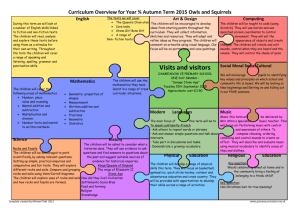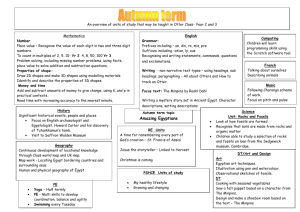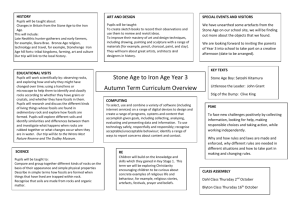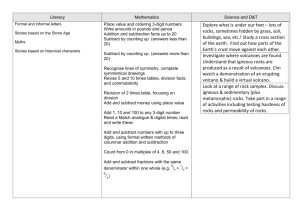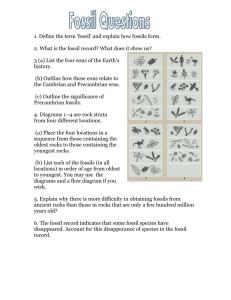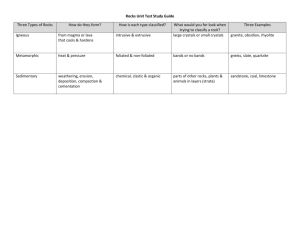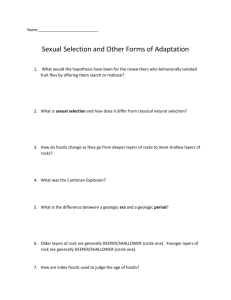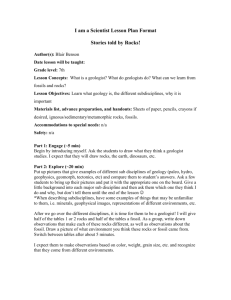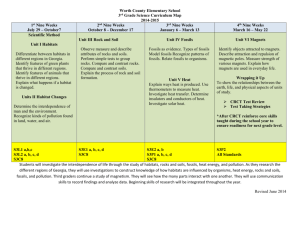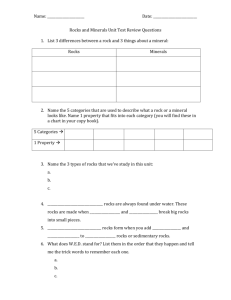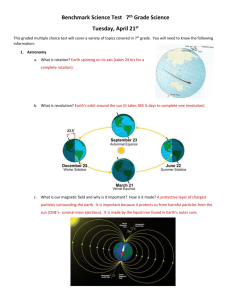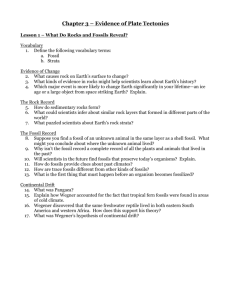Solid as a Rock – Cycle 1
advertisement
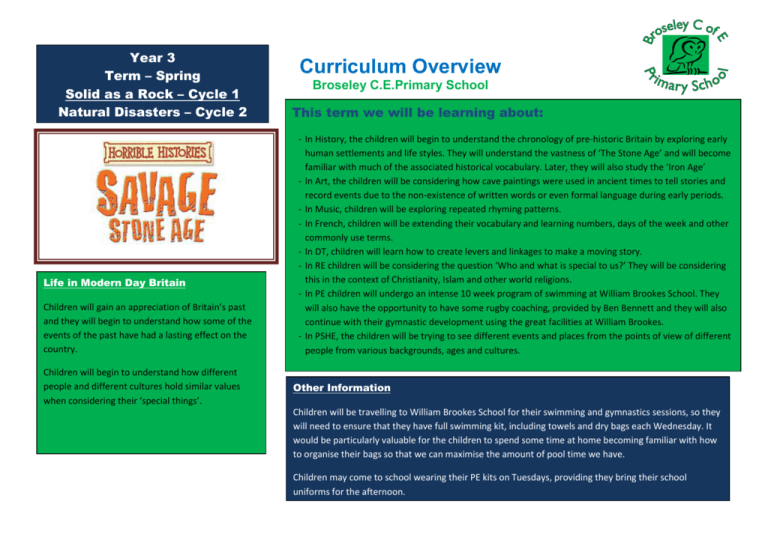
Year 3 Term – Spring Solid as a Rock – Cycle 1 Natural Disasters – Cycle 2 Life in Modern Day Britain Children will gain an appreciation of Britain’s past and they will begin to understand how some of the events of the past have had a lasting effect on the country. Children will begin to understand how different people and different cultures hold similar values when considering their ‘special things’. Curriculum Overview Broseley C.E.Primary School This term we will be learning about: - In History, the children will begin to understand the chronology of pre-historic Britain by exploring early human settlements and life styles. They will understand the vastness of ‘The Stone Age’ and will become familiar with much of the associated historical vocabulary. Later, they will also study the ‘Iron Age’ - In Art, the children will be considering how cave paintings were used in ancient times to tell stories and record events due to the non-existence of written words or even formal language during early periods. - In Music, children will be exploring repeated rhyming patterns. - In French, children will be extending their vocabulary and learning numbers, days of the week and other commonly use terms. - In DT, children will learn how to create levers and linkages to make a moving story. - In RE children will be considering the question ‘Who and what is special to us?’ They will be considering this in the context of Christianity, Islam and other world religions. - In PE children will undergo an intense 10 week program of swimming at William Brookes School. They will also have the opportunity to have some rugby coaching, provided by Ben Bennett and they will also continue with their gymnastic development using the great facilities at William Brookes. - In PSHE, the children will be trying to see different events and places from the points of view of different people from various backgrounds, ages and cultures. Other Information Children will be travelling to William Brookes School for their swimming and gymnastics sessions, so they will need to ensure that they have full swimming kit, including towels and dry bags each Wednesday. It would be particularly valuable for the children to spend some time at home becoming familiar with how to organise their bags so that we can maximise the amount of pool time we have. Children may come to school wearing their PE kits on Tuesdays, providing they bring their school uniforms for the afternoon. English Children will be reading a range of nonfiction texts in an historical context. Where possible, these will be linked to Pre-historic Britain, Fossils, Rocks and Soils. The children will listen to the story ‘Stig of the Dump’. Children will be taught about possessive apostrophes and common prefixes in their spelling lessons. In writing non-fiction, children will be thinking about information pages linked to; building shelters in the Stone Age, huntergatherers, fossils and archaeological discoveries. When writing narrative, children will consider historical people / characters in modern day settings (Stig of the Dump) and stories linked to historical discoveries and journeys into the past. Computing We will be producing short video s of ourselves as reporters. This will include editing the videos we produce. Children will also use ICT to produce journalistic writing linked to historical discoveries. Curriculum Overview Broseley C.E.Primary School Mathematics Science Children will strengthen their understanding of number, place value and rounding. Throughout the term, children will be: comparing and sorting rocks; learning about types of rock based on the way they are formed (Metamorphic, Sedimentary and Igneous); the physical properties of rocks linked to their uses; Soils made from rocks and organic matter; the formation of Fossils and some of the scientific processes involved in archaeology. They will use partitioning to add and subtract 2 digit numbers and they will be using their knowledge of money to make addition and subtraction calculations. Later, they will also learn how to use formal columnar methods for addition and subtraction. They will use written strategies for multiplication and division and they will be multiplying one- digit numbers by multiples of 10. Late, they will be multiplying and dividing much larger numbers. Children will also recognise and draw right angles in 2D shapes Children will continue to develop their understanding of fractions by representing, comparing and ordering unit and nonunit fractions of shapes and numbers Children will be measuring mass by using grams and kilograms. Children will be reading and interpreting bar charts, and using scales. You might like to join in our learning at home Reading Watching Although we do daily guided reading sessions in school, children have limited opportunity to read independently in school so reading at home is still very important. Local history books and stories set in prehistory (those where dinosaurs and people did not actually meet!) would be ideal reading materials this term. They will be read Stig of the Dump. Children will be watching video clips from documentaries about archaeological digs and reconstructions of life in The Stone Age. There may even be a few episodes / clips from Horrible Histories that could prove useful. Doing Visiting In DT, children will be designing and making moving stories using levers and linkages. You could try to make your own, you’ll need split pins and card strips. There are many places in Shropshire of pre-historic interest, several of them are mentioned on this website – http://www.discovershropshire.org.uk – just follow the links ‘History’ - ‘Periods of Shropshire’s History’ and then look under Stone Age and Iron Age. Children will be having a weekly spelling test and ‘nearly weekly’ multiplication tests (2, 5, 10, 3, 4 and 8 times tables). Children will be asked to bring in items from home at various points. This could include rocks and fossils that they may have or ‘special items’ suitable for discussion in RE. They will also be watching clips of geologists describing rocks and rock formation. Castle Ring the highest point on Cannock Chase, serves as a great example of and Iron Age hill fort, which we may organise a visit to after half term.
